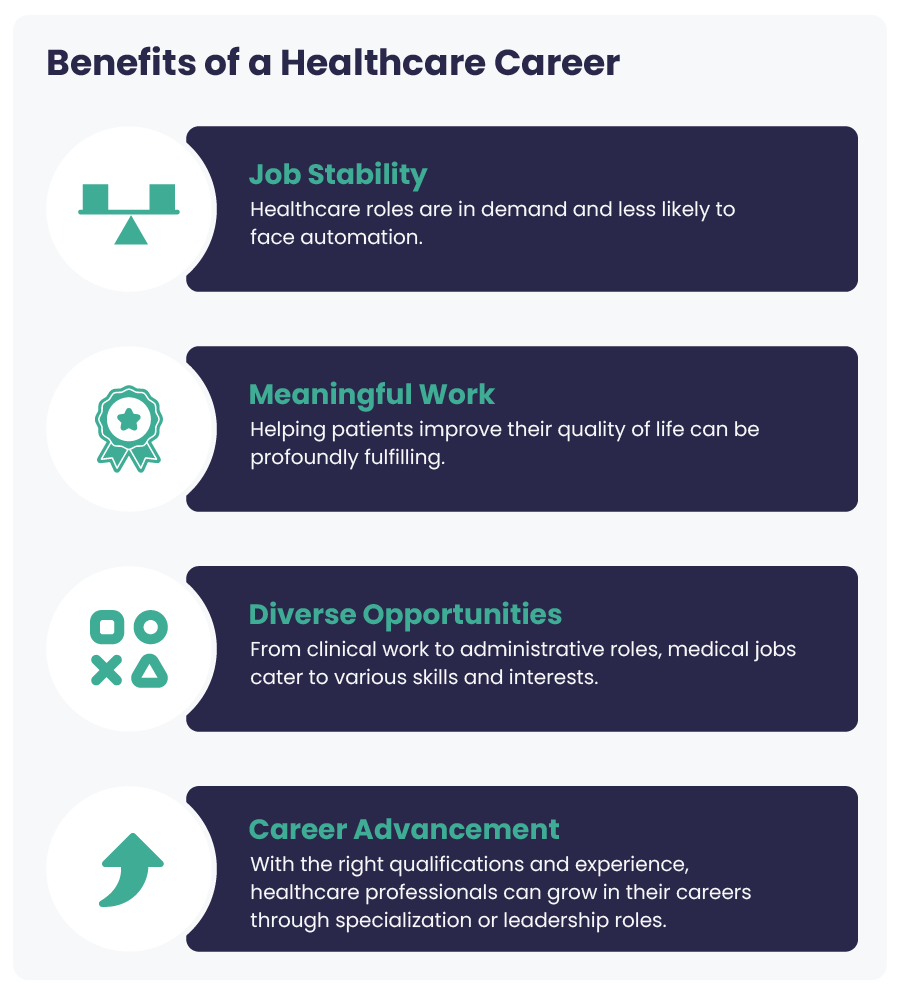Your Guide to a Successful Career in Healthcare: Tips for Job Seekers
Job Seeker Resources
Jan 14, 2025

Your Guide to a Successful Career in Healthcare: Tips for Job Seekers
Starting or advancing your career in healthcare can feel overwhelming, but the right guidance can make all the difference. In this blog, you'll find practical advice and actionable tips to help you navigate your professional journey in healthcare with confidence and clarity. Whether you're seeking new opportunities, refining your skills, or considering a career change, you’re in the right place. Let’s dive in.
Why Healthcare is a Great Career Choice
Healthcare is consistently ranked as one of the fastest-growing industries, offering a wide range of opportunities across fields from nursing to medical technology, healthcare administration, direct patient care and more. With an aging population, advancements in medical technology, and increasing demand for healthcare services, the sector is expected to continue expanding. If you're motivated by a desire to help others, fascinated by medical science, or seeking long-term job stability, you’ll find a career in healthcare offers the potential for both personal fulfillment and professional growth.

How to Get Started in the Medical Field
So, you've decided to pursue a career in healthcare—awesome! That's the first big step. If you're not sure where to go from here, don’t worry—we've put together a guide to help you get on the right track. Keep in mind that different healthcare roles have varying requirements for education, licensing, and experience. This guide will give you a solid starting point for your research, and when you're ready to apply for jobs, be sure to check out our job board, designed specifically for healthcare professionals like you.

1. Explore Healthcare Career Options
Healthcare is more than just becoming a doctor or nurse. Researching medical career options can help you identify roles that align with your skills and interests. For instance:
- Clinical Roles: Doctors, nurses, physical therapists, and lab technicians.
- Non-Clinical Roles: Medical billing, healthcare administration, and medical sales.
- Specialized Fields: Radiology, anesthesiology, and medical research.
Tip: Look into different healthcare career paths to get a comprehensive understanding of your options.
2. Research Qualifications and Training
It’s a good idea to familiarize yourself with the necessary programs, time commitment, financial investment, and any additional experience needed for the roles that interest you. Here are some examples:
- Medical Assistants: Often require certification through a vocational or technical school.
- Registered Nurses: Need a nursing degree (such as an associate’s or bachelor’s) and state licensure.
- Healthcare Administrators: Typically hold degrees in healthcare management, public health, or business administration.
- Physicians and Surgeons: Require a bachelor's degree, completion of medical school, and residency training. They must also pass a licensing exam and may pursue board certification in a specialty.
Tip: Many entry-level healthcare roles, such as patient care technicians, phlebotomists, or medical office assistants, provide on-the-job training, allowing you to gain experience while preparing for more advanced roles.
Exploring these requirements ahead of time can help you create a clear roadmap for your professional journey in healthcare.
3. Gain Relevant Experience
Hands-on experience is invaluable when pursuing a career in healthcare. Consider:
- Volunteering at hospitals or clinics.
- Completing internships or externships during your studies.
- Shadowing healthcare professionals to understand the day-to-day responsibilities.
4. Start Your Job Search
When beginning your job search in healthcare, it’s essential to stand out in a competitive field. Here are some practical tips to help new graduates and professionals secure the right role:
- Tailor Your Resume and Cover Letter: Customize these documents for each position, highlighting not only your qualifications but also soft skills like empathy, communication, adaptability, and attention to detail—qualities highly valued in the medical field. Use specific examples to demonstrate how you've applied these skills in clinical or professional settings.
- Leverage Internships and Clinical Experience: Emphasize any internships, clinical rotations, or volunteer work you've completed. These experiences not only showcase your practical skills, familiarity with healthcare environments, and commitment to patient care but can also open doors to job opportunities. Many organizations use internships as a pipeline for hiring, so building strong relationships and demonstrating your value during these experiences can increase your chances of being offered a permanent position.
- Network Strategically: Connect with professionals in your field through LinkedIn, alumni networks, or local healthcare organizations. Attend career fairs, webinars, or industry events to build relationships and discover job opportunities.
- Use Healthcare-Specific Job Boards: Platforms like ProfiHitch, or your local hospital's career page often list openings tailored to healthcare professionals. These can help you find roles aligned with your qualifications.
- Research Employers: Learn about potential employers' mission, values, and culture. Tailor your application to show how you align with their goals and can contribute to their team.
- Practice for Interviews: Healthcare interviews often include behavioral and situational questions. Prepare responses to common questions that highlight your problem-solving abilities, teamwork, and patient-centered care. Use the STAR (Situation, Task, Action, Result) method to structure your answers.
- Follow Up Thoughtfully: After submitting applications or attending interviews, send a thank-you email. Express gratitude for the opportunity and reiterate your interest in the position.
Taking these steps can help you not only find job openings but also present yourself as a strong candidate ready to contribute to the healthcare field.
Tip: Take time to identify the qualities that matter most to you in a job—such as work-life balance, salary, job stability, opportunities for growth, benefits, or work environment. Clarifying your priorities can help you narrow down your options and choose a role that truly aligns with your goals and values. Discover your career "love language" here.
Tips for Success in a Healthcare Career
Once you’ve secured a role in the medical field, it’s important to focus on growth and adaptability. Here are a few healthcare tips for long-term success:
- Continue Learning: Healthcare evolves rapidly, so stay current through certifications and workshops.
- Build a Network: Join professional associations and attend conferences to connect with industry leaders.
- Maintain Work-Life Balance: While the medical field can be demanding, prioritizing self-care ensures you remain effective and energized.

Conclusion
Pursuing a career in healthcare is a fulfilling and stable choice with a wide range of opportunities. By exploring different health career pathways, gaining the necessary training, and approaching your job hunt strategically, you can carve out a successful and rewarding career in medicine.
Whether you're new to the field or looking for the next step in your medical career, this guide provides actionable advice to set you on the right path. Start your journey today—find the right healthcare career with ProfiHitch.



